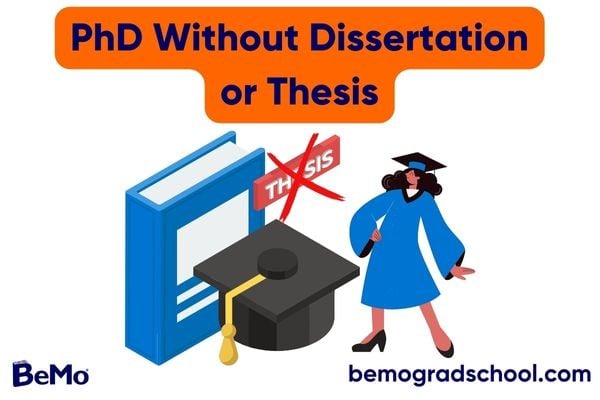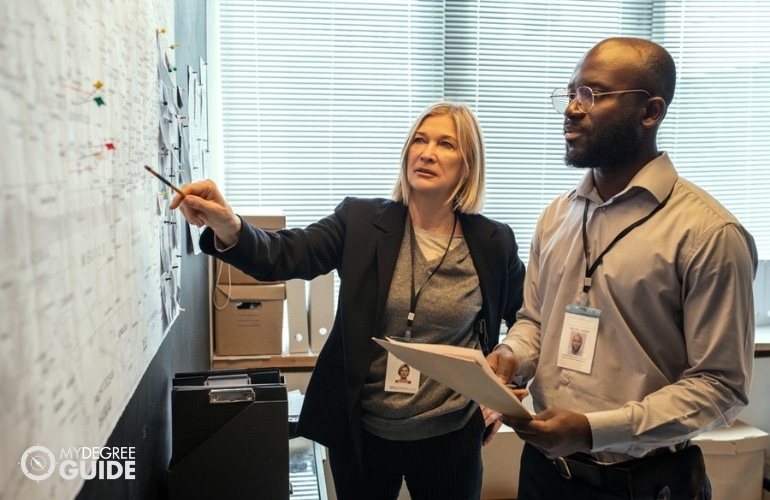Doctorate Without Thesis: Everything You Need to Know
It is possible to earn a doctorate without thesis. Surprised? Discover everything you need to know about this subject and find out how.
Are you considering pursuing a doctorate degree but the thought of conducting extensive research and writing a thesis is daunting? If so, then a doctorate degree without a thesis might be the perfect fit for you. In this blog post, we will explore the world of doctorate degrees without a thesis, including what they are, the types available, their advantages and disadvantages, eligibility criteria, career opportunities, and tips for choosing the right program.

What Is a Doctorate Without Thesis?
A doctorate degree without a thesis is a terminal degree that does not require a student to conduct original research and write a dissertation. Instead, students may be required to complete a capstone project, comprehensive exam, or a final project that demonstrates their knowledge and skills in their field of study.
Types of Doctoral Degrees Without Thesis
There are several types of doctoral degrees that do not require a thesis. Some of the most common include:
Doctor of Business Administration (DBA)
A Doctor of Business Administration (DBA) degree focuses on practical applications of business theory and strategy. Students typically take courses in finance, marketing, management, and leadership. Instead of a thesis, DBA students may be required to complete a final project that applies their knowledge to real-world business problems.
Doctor of Education (EdD)
A Doctor of Education (EdD) degree is designed for educators who want to advance their careers in academia or administration. EdD programs focus on educational leadership, curriculum development, and research methods. Instead of a thesis, EdD students may be required to complete a capstone project that demonstrates their ability to apply research to solve practical problems in education.
Doctor of Public Administration (DPA)
A Doctor of Public Administration (DPA) degree is ideal for those who want to work in government or non-profit organizations. DPA programs focus on public policy, management, and leadership. Instead of a thesis, DPA students may be required to complete a final project that addresses a real-world public administration problem.
Doctor of Psychology (PsyD)
A Doctor of Psychology (PsyD) degree is an alternative to the traditional Doctor of Philosophy (PhD) in Psychology. PsyD programs focus on clinical practice rather than research. Instead of a thesis, PsyD students may be required to complete a doctoral project that demonstrates their clinical skills.
Advantages and Disadvantages of Doctoral Degrees Without Thesis
There are both advantages and disadvantages to pursuing a doctoral degree without a thesis.
Advantages:
- Less time and effort required compared to a thesis-based program
- More focused on practical skills and applications
- Can be a good fit for those who want to advance their careers without becoming researchers
Disadvantages :
- May not be as highly valued by employers or academic institutions
- May not provide as strong of a foundation in research and academic writing
- May limit future career opportunities in academia or research-based positions
Eligibility Criteria for Doctoral Degrees Without Thesis
Eligibility criteria for doctoral degrees without a thesis vary by program and institution. In general, applicants should hold a master’s degree in a related field, have a strong academic record, and meet any additional requirements such as work experience or licensure.
Career Opportunities After Obtaining a Doctorate Without Thesis
Career opportunities after obtaining a doctorate without thesis depend on the program and the student’s career goals. Graduates may be able to pursue careers in academia, government, non-profit organizations, or the private sector. Some potential job titles include executive director, chief operating officer, or senior-level researcher.
Tips for Choosing the Right Program for a Doctorate Without Thesis
If you’re considering pursuing a doctorate degree without a thesis, it’s important to choose the right program. Here are some tips to help you make an informed decision:
- Research different programs : Look for programs that align with your career goals and interests. Consider factors such as program format, faculty, reputation, and accreditation.
- Check eligibility requirements : Make sure you meet the eligibility criteria for the programs you’re interested in. This may include having a master’s degree, work experience, or specific licensure.
- Consider program structure : Doctorate programs without a thesis may require a final project, comprehensive exam, or capstone project. Consider which format aligns with your learning style and career goals.
- Look for flexibility : Consider programs that offer flexible scheduling or online options if you need to balance your studies with work or other commitments.
- Evaluate career outcomes : Research the career outcomes of graduates from the programs you’re interested in. Look for programs that have a strong track record of producing successful graduates in your desired field.
The Best Infographic Maker and Overall Full-Stack Design Tool
Mind the Graph is a full-stack design tool that helps scientists and researchers create professional-grade infographics, presentations, and posters. With a library of over 75,000 scientific illustrations and templates, Mind the Graph makes it easy to visualize complex data and concepts.
Some key features of Mind the Graph include:
- Drag-and-drop interface: Users can easily add, resize, and edit elements on their designs using a simple drag-and-drop interface.
- Scientific illustrations and templates: The platform offers a vast library of illustrations and templates covering a wide range of scientific topics, from biology to chemistry to physics.
- Collaboration tools: Users can share designs with colleagues and collaborate in real-time to make changes and edits.
- Branding options: Users can customize their designs with their own branding elements, such as logos, colors, and fonts.
- Export options: Designs can be exported in a variety of formats, including PDF, PNG, and JPEG.
Overall, Mind the Graph is a valuable tool for scientists and researchers who want to create visually compelling and informative designs to communicate their research findings.

Subscribe to our newsletter
Exclusive high quality content about effective visual communication in science.
Unlock Your Creativity
Create infographics, presentations and other scientifically-accurate designs without hassle — absolutely free for 7 days!
Content tags
- Graduate School
PhD Without Dissertation or Thesis
Featured Expert: Dr. Gurmeet Lall, PhD

Final doctoral projects can be intimidating or time-consuming, which is why many students look for a PhD without dissertation. What they soon discover while learning how to find a PhD topic is that the Doctor of Philosophy degree itself is heavily tied to research capabilities and publishing scholarship. As a result, it is very difficult to find PhD programs specifically that have no dissertation requirement. However, other doctoral degrees in various fields do exist and can be granted from programs without a traditional dissertation or thesis defense process.
This article lists the kinds of doctorate-level programs that do not have traditional dissertation requirements necessary for completion. We also cover what are the reasons a doctorate program without dissertation may or may not be beneficial for students, and how grad school application help can be used to make the decision.
Disclaimer: Please note: although we have made every effort to provide the most accurate information, admissions information changes frequently. Therefore, we encourage you to verify these details with the official university admissions office. You are responsible for your own results. BeMo does not endorse nor affiliate with any official universities, colleges, or test administrators and vice versa.
>> Want us to help you get accepted? Schedule a free strategy call here . <<
Article Contents 9 min read
Examples of doctorate programs without dissertation.
Note: This is not an exhaustive list. These examples are simply meant to highlight the various types of doctorate programs that are available and how they address the lack of a traditional dissertation to complete their program.
1. Education & Leadership in Healthcare Online Doctorate at Nebraska Methodist College
This virtual option from Nebraska Methodist College does not require any formal dissertation nor the Graduate Record Examination (GRE). Instead, students in this full-time 24-month (or 36-month, part-time) program must complete a Doctoral Capstone Project. The final submission is a translational research project that explores a question within a field relevant to the program that is meant to align with your career goals.
Are you working on your grad school application? Watch this video:
2. EdD Program in Educational Leadership at Nova Southeastern University
This on-campus program in Fort Lauderdale, Florida offers two Capstone options for completing your education. One is an applied dissertation and the other is a Strategic Research Project (SRP). Both options are meant to prepare graduates for educational leadership. Career paths after this degree include school superintendent, professor of education, and education consulting, among others.
3. Online Doctor of Business Administration at Liberty University
In this 100% online program, students can choose from various specialized paths to further their education of management in the corporate world. Through mentorship from respected business professionals, you will learn the skills to advance your career. No dissertation is required for completion of this DBA program.
4. Transitional Doctorate in Physical Therapy at The University of North Carolina at Chapel Hill, School of Medicine
At one of the top medical schools in North Carolina , this transitional DPT program with web-based instruction is for licensed physical therapists who wish to continue practicing while pursuing this degree. It is only offered on a part-time schedule over 2 years and requires the completion of 27 credits of approved coursework. There is no final or dissertation project.
As you see from the list above, it is very uncommon for a PhD program to not have a dissertation or thesis at the end of it. Programs labelled with the Doctor of Philosophy moniker tend to be based in research, which lend themselves to the student completing a final cumulative research project such as a dissertation. When you answer, “Why do you want to a PhD?” , your answer will typically involve specific research interests you wish to pursue. If you want to pursue a PhD but do not want to complete a dissertation, you may want to explore other viable education options. PhDs and research are inherently linked, so it is difficult to find PhD programs specifically that do not require any form of dissertation.
Instead, what you will likely find is that there are various other degrees, such as a Doctor of Education, that do not require a formal dissertation. In these cases, a traditional thesis is replaced by another form of cumulative project or work experience. In some cases, there could be no final project at all. These are still not common but are more likely to appear in your search results. Deciding what path you would like to pursue will come once you figure out your plans for how to find a job after grad school . The eventual career you are aiming for may impact your ultimate decision to enroll in a doctorate program without a dissertation to complete. Here are some of the pros and cons of these rare kinds of programs:
- No Thesis Responsibility. One of the main pros of a doctorate degree without dissertation is that you will not have to learn how to prepare for a thesis defense . While some other capstone project or culminating experience may be required, you may not necessarily need to defend your research in front of professors or other faculty. Preparing for a thesis defense can be one of the most nerve-wracking parts of your PhD. After having done all the research over the last year or so and written a document that could be hundreds of pages long, justifying your work puts a lot of pressure on your shoulders. Having no dissertation at all will waive this requirement and prevent you from having to review any thesis defense questions .
- No Limitations. Doctoral programs without a dissertation can also be more flexible in nature. They could be delivered online, for instance, so you do not need to be living in the same city as your university to successfully complete your degree. That is a huge advantage for those who are employed or cannot afford the travel expenses. It allows higher education degrees to become more accessible overall. Depending on the requirements of the program and the department offering it, these types of programs can become some of the easiest PhD programs to get into due to their open access.
- No Wasted Time. These types of degrees may also take less time to complete since there is no long dissertation to complete beforehand. You will need to spend less time finding thesis writing services , working on the project with your supervisor, and can focus on coursework or other commitments instead. It is no secret that graduate students have a lot on their plate. Working on a dissertation can make a PhD a very singular and lonely experience, so having the option to opt out of it may be very beneficial for the education and well-being of many students.
- No Unnecessary Research. If you are planning to figure out how to transition from academia to industry , a doctorate degree without dissertation may be worth it for you. The research required for lends itself to academic jobs, meaning that jobs in industry are less likely to see as much value in a complex research project. When a career in industry is of interest to you, you may to consider alternative doctoral programs that better suit your interests. Whatever field you are interested in, getting professional experience at the end of a PhD may be more beneficial to you than a dissertation will.
- Career Preparation. Those that wish to learn how to find a job in academia know that it can be competitive and difficult, even if you have a doctorate degree. It is never guaranteed that you will find a stable position at a college or university after graduation. Getting a role with tenure or finding the right amount of teaching experience is not the simplest of tasks, which can lead to a lot of uncertainty and doubt in PhD students. Resolving those worries starts with getting as much research possible. Being aware of how to publish as a graduate student is key, but your dissertation is also a great way to indicate that you have what it takes to succeed in a career in academia from a research perspective. If you need to find a postdoc position or hope to continue working as a professor, completing a dissertation during your PhD will be a step in the right direction.
- Skill Recognition. A program without a dissertation may not be the best representation of your skills or abilities. They are often very specific or only benefit a particular subset of students/professionals already working in the field. In contrast, PhD programs with a dissertation can lend themselves more to what you are good at if you are a talented writer and researcher or do not meet the criteria for a more specified program. If this is the case, traditional research programs might be more appealing to you. An internship or another type of project may not be the most ideal reflection of how you can contribute to a future career. Therefore, a doctorate degree without a dissertation may be too much of a jump away from your goals.
- Negative Reputation. Due to a doctorate degree with no dissertation being a more modern concept, it may also be seen as of lower value than a traditional research PhDs in a variety of industries as well as academic settings. As these programs are more likely to be fully online, this may give them a bad rap as well. Changes to the traditional format of academic study may require additional explanation to employers and could result in lower job prospects. As always, this will certainly depend on what field you are entering, but not completing a dissertation can potentially sour your CV in the eyes of those who are hiring.
- Restrictive Matriculation. As much as graduate programs without a dissertation may be flexible, they are also restrictive in other ways. While online programs can be extremely convenient for some students, others simply do not learn the best in that environment. Virtual delivery of courses can be one of the best graduate school recruitment strategies , but can also alienate other types of students and deter them from applying. The majority of these doctorate programs are completely online or require you to already be a working professional, which might not be the case for some of those.
Conclusion
The higher education landscape is ever-changing. What is necessary to access the highest level of learning possible constantly shifts as the years go by. With online programs, you have more options than ever before when considering the ways to achieve a valuable education that will lead to a fulfilling career. When evaluating should you pursue a master’s or a PhD , really get down to the reason why you are completing a graduate degree. Search different universities and programs to see what is out there for you. An informed decision is always the smartest one, so it is important to become very familiar with the choices available early on.
Speaking with PhD consultants can also be helpful for your applications or for determining what is the right program that will serve you best based on your individual goals. Depending on your discipline and interests, a dissertation (or a graduate program, in general) may not always be necessary to achieve your dream. Ideally, you will want your eventual program to match with your grad school career goals statement and get you the best shot at securing your future plans. It is up to you with regards to how you get there.
PhD programs in particular are meant to prove your suitability for the field you are pursuing. With the degree, you are expected to be a working academic with the expectation of contributing to current scholarship in some way. This means that you have to be able to present forward-thinking research and fill gaps in contemporary publications. The dissertation or thesis is a culmination of your graduate school research displayed in one final project that you must defend.
While you may have another form of final project, not having to write a long dissertation or prepare for a thesis defense will be a plus for a lot of applicants. They can also be fully delivered online and be more accessible to students living in another place. These types of programs seem to suit more industry jobs rather than other careers in academia, which may be appealing to applicants who wish to transition to industry.
The programs that do not require a dissertation may be seen as less valuable than ones that do, depending on the discipline. The online format most of the programs entail may be a benefit for others, but a detriment to others. A doctorate degree can also be not as useful for students who wish to continue working in academic settings, where research experience is crucial.
Some of the most common doctoral degrees you will find that do not require a PhD are Doctor of Education (EdD), Doctor of Business Administration (DBA), Doctor of Nursing Practice (DNP), and other doctorates related to public health domains.
Many programs will still have a final submission or capstone project as part of their curriculum that does not need the same amount of research effort as a formal dissertation. They may also need to complete for some of field experience that illustrates their capabilities for working within the discipline chosen. For instance,
Most of the time, you do not need a master’s or PhD to apply to medical school . If you meet the other academic requirements such as high MCAT and GPA scores, a graduate degree will not necessarily boost your chances. If you were to complete a master’s or doctorate-level degree, you will likely need to have research experience regardless, so choosing a program with a thesis or dissertation will probably be more beneficial to you in the long run.
Academic positions are more focused on teaching and research in a higher education setting. They could be listed as on the tenure-track, which leads to permanent employment, or the non-tenure-track, which does not guarantee permanent employment. Industry jobs tend to work outside of universities and are based within enterprises and other for-profit companies. Many PhDs and other doctoral-level graduates can work in either the academic or industry setting, depending on their interests or job prospects in the field.
Seeking professional help from a grad school admissions consultant can improve all aspects of your application. They are typically trained experts who are very knowledgeable about competitive academic programs at the graduate level. They can assist with writing or editing graduate school statement of purpose , conduct interview simulations, situational judgment test preparation, and more. If you are struggling with deciding between a dissertation and non-dissertation doctoral programs, consultants can point you in the right direction that aligns with your goals.
Want more free tips? Subscribe to our channels for more free and useful content!
Apple Podcasts
Like our blog? Write for us ! >>
Have a question ask our admissions experts below and we'll answer your questions, get started now.
Talk to one of our admissions experts
Our site uses cookies. By using our website, you agree with our cookie policy .
FREE Training Webinar:
How to make your grad school application stand out, (and avoid the top 5 mistakes that get most rejected).
Time Sensitive. Limited Spots Available:
We guarantee you'll get into grad school or you don't pay.
Swipe up to see a great offer!
- List of Colleges
Online Programs
- Advantages & Challenges
Choosing a Program
- Financial Aid
Best 18-Month Doctorate without Dissertation [2024 Guide]
An 18-month doctorate without dissertation is a strategic option for those looking to advance their education quickly and efficiently.

This guide explores a variety of professional doctorates, covering diverse fields from business administration to social work. You can gain insights into the subjects each degree covers as well as the potential career paths they can lead to.
Editorial Listing ShortCode:
Whether you’re looking to climb the career ladder or pivot to a new field, read on to discover a range of accelerated doctorate programs that don’t have a dissertation component.
List of Colleges Offering No Dissertation Doctorates
Methodology: The following school list is in alphabetical order. To be included, a college or university must be regionally accredited and offer degree programs online or in a hybrid format.
Boston University
Boston University’s 18 month post-professional OTD program is tailored for occupational therapy graduates and focuses on innovative practice and research. It requires the completion of 33 to 37 credits, depending on prior coursework. Classes are online and 7 weeks long, allowing flexibility with three annual start dates. Students work on their doctoral projects each semester instead of completing a final dissertation.
Boston University is accredited by the New England Commission of Higher Education.
Chatham University
Chatham University offers a 16 month online OTD program designed for occupational therapists aspiring to leadership roles. It requires the completion of 30 credits over 4 terms and allows students to progress by taking two classes at a time. Some courses in the curriculum are 7 weeks long, while others are 14 weeks long. The program is 100% online, providing flexibility for professionals to balance their studies with other commitments.
Chatham University is accredited by the Middle States Commission on Higher Education.
Frontier Nursing University
Frontier Nursing University’s Doctor of Nursing Practice (DNP) program is intended for registered nurses seeking advanced clinical, leadership, and organizational roles. It’s an 18 month, online program that requires the completion of 30 credit hours.
Students undertake a Quality Improvement project instead of a dissertation, focusing on enhancing healthcare delivery and outcomes through practical, evidence-based initiatives.
FNU is accredited by the Southern Association of Colleges and Schools Commission on Colleges.
Quinnipiac University
Quinnipiac University’s post-professional OTD program is tailored for practicing registered occupational therapists. It has minimal campus requirements and may be completed in 5 semesters.
Courses are offered in varying durations (5, 7, and 14 weeks long) and designed for working professionals. The program seeks to help students become leaders and evidence-based scholars without a dissertation requirement.
Quinnipiac University is accredited by the New England Commission of Higher Education.
Utica University
Utica University’s Doctor of Physical Therapy program combines online and on-campus learning and may be completed in 3 years. It’s crafted to enhance evidence-based practice, clinical, and research skills, aiming to equip aspiring physical therapists for the licensure exam. The curriculum encourages the development of diagnostic and critical thinking skills through a mix of instructional methods and practical case studies.
Utica University is accredited by the Middle States Commission on Higher Education.
Valparaiso University
Valparaiso University’s online post-professional Doctor of Occupational Therapy (DROT) is a 30 credit, fully online program. It is designed to be completed over 4 semesters and a capstone, potentially in just 18 months. It aims to prepare graduates for advanced roles in mentorship, education, evidence-based practice, and policy-making. The curriculum focuses on innovation without requiring a dissertation.
Valparaiso University is accredited by the Higher Learning Commission.
According to the U.S. Census Bureau , there’s a growing trend in higher education, with more people earning advanced degrees. Online doctorate programs that don’t require a traditional dissertation can often be completed in less time, some in as little as 18 months.
The following degree options showcase the wide range of fields that offer accelerated doctoral programs. Select the program that most interests you to jump to that section of the guide:
- Doctorate in Accounting
- Doctorate in Business Administration
- Doctorate in Computers & Information Technology
- Doctorate in Criminal Justice
- Doctorate in Education
- Doctorate in Engineering
- Doctorate in Entrepreneurship
- Doctorate in Finance
- Doctorate in Healthcare Administration
- Doctorate in Information Technology
- Doctorate in Liberal Arts
- Doctorate in Marketing
- Doctorate in Ministry
- Doctorate in Nursing
- Doctorate in Occupational Therapy
- Doctorate in Physical Therapy
- Doctorate in Public Administration
- Doctorate in Public Health
- Doctorate in Psychology
- Doctorate in Social Work
The program that’s best for you will depend on your personal interests and professional goals.
DBA in Accounting

An online DBA in Accounting helps you develop advanced accounting expertise and qualifications. This doctorate emphasizes applying accounting principles and strategies directly to professional settings, equipping you with skills to lead in dynamic business environments.
Key subjects studied include advanced financial reporting, strategic taxation, and auditing practices. With a focus on real-world financial challenges and strategic decision-making, an online DBA with no dissertation program can help prepare you for high-level finance roles, such as chief financial officer or financial strategist.
Doctor of Business Administration (DBA)

An accelerated Doctor of Business Administration program with no dissertation offers a swift path to advanced business leadership expertise.
Key subjects studied include global business strategies, organizational leadership, and business analytics. This program is beneficial for those aspiring to senior management roles or consultancy, as it focuses on broad-based business acumen applicable across various industries.
A DBA can help you develop practical skills for effective leadership and strategic planning in the ever-evolving global business landscape.
Computer Science

An 18-month non-dissertation doctorate in computer science program is a rapid route to advanced technological expertise.
This program is aimed at professionals who are eyeing leadership roles in tech industries. It emphasizes cutting-edge computing technologies and problem-solving in real-world contexts. Key subjects studied include advanced algorithms, data analytics and big data, and cybersecurity.
You can learn to apply advanced computer science principles in areas like software development, data security, and AI.
Doctor of Criminal Justice (DCJ)

An accelerated Doctor of Criminal Justice program offers a fast-track to expertise in criminal justice leadership. With a focus on contemporary issues in the criminal justice system, the program covers key subjects like advanced criminology, law enforcement leadership, and criminal justice policy and administration.
You can become better equipped to make informed decisions and lead effectively in various criminal justice settings. Many graduates pursue high-level positions in law enforcement, policymaking, or justice administration.
Doctor of Education (EdD)

A non dissertation EdD program is designed for rapid advancement in educational leadership and innovation. This program emphasizes applying educational theories and practices to address contemporary challenges in education.
Key subjects studied include curriculum design and assessment, educational leadership and policy, and instructional technology. An EdD is common for aspiring educational leaders, administrators, and policymakers.
With in person or online doctoral programs in education without dissertation , you can become adept at implementing effective educational strategies, driving organizational change in educational settings, and contributing to policy development.
Doctor of Engineering (D.Eng)

A non-dissertation Doctor of Engineering program offers a rapid path to advanced engineering leadership. This program is designed for professionals who want to pursue executive or high-level managerial roles in engineering.
A DEng program helps prepare you to effectively lead engineering projects and innovations, integrating theoretical knowledge with hands-on application in a variety of engineering fields. Key subjects studied include advanced engineering management, sustainable engineering practices, and emerging technological innovations.
DBA in Entrepreneurship

An online DBA in Entrepreneurship program without a dissertation is a streamlined path to mastering entrepreneurial leadership. This specialized DBA is tailored for aspiring entrepreneurs or business leaders, helping you hone skills in creating, developing, and managing successful entrepreneurial ventures.
Core subjects studied include innovation and venture development, strategic entrepreneurship, and entrepreneurial finance. With an entrepreneurship DBA, you can grow your knowledge of how to launch and grow businesses, apply innovative strategies, and lead entrepreneurial initiatives.
DBA in Finance

A DBA in Finance emphasizes strategic financial management and decision-making in business. Key subjects studied include advanced corporate finance, investment strategies and analysis, and financial risk management.
A finance DBA is geared toward professionals who want to pursue roles such as CFOs or financial consultants. As a graduate, you may be ready to take charge in finance departments, handle complex investment portfolios, and tackle the intricacies of financial markets.
Doctor of Healthcare Administration (DHA)

A Doctor of Healthcare Administration focuses on managing healthcare systems effectively and ethically. This doctorate program is designed for professionals who are seeking leadership and executive roles in healthcare organizations.
A DHA combines theoretical knowledge with practical skills for real-world healthcare management. Key subjects studied include healthcare policy and regulation, organizational leadership in healthcare, and health services management. You can become better equipped to improve healthcare delivery, lead healthcare organizations, and influence policy.
Doctor of Information Technology (DIT)

A doctorate in information technology is beneficial for professionals who are eyeing senior and leadership roles in the IT sector. DIT programs emphasize the strategic application of IT in business and organizational contexts.
Key subjects studied include advanced data analytics, cybersecurity management, and IT strategic planning. You can become better equipped to tackle complex IT challenges, lead technology-driven initiatives, and drive IT strategies that align with organizational goals.
Doctor of Liberal Arts (DLA)

A Doctor of Liberal Arts offers an advanced education through diverse interdisciplinary studies. A DLA is aimed at professionals in education, policymaking, and cultural sectors.
While this program involves a broad perspective on arts and humanities, key subjects include cultural studies, ethical and political theory, and interdisciplinary research methods. Graduates can could apply their comprehensive liberal arts knowledge in a variety of fields, promoting understanding and innovation in both academic and real-world settings.
DBA in Marketing

A DBA in Marketing blends advanced marketing strategies with practical applications. This program focuses on applying contemporary marketing theories to real-world business scenarios.
Key subjects studied include consumer behavior analysis, digital marketing strategies, and brand management. This program can help you develop the skills to lead innovative marketing campaigns and strategies. A marketing DBA is especially beneficial for professionals working toward senior marketing roles.
Doctor of Ministry (DMin)

A Doctor of Ministry focuses on practical ministry skills and leadership strategy. Since it’s designed for ministry professionals, it emphasizes real-world application of theological concepts and leadership in faith-based contexts.
Key subjects covered in a DMin program include pastoral care and counseling, theological reflection and application, and ministry leadership dynamics. A DMin could help prepare you to lead congregations, manage ministry programs, and engage effectively with communities.
Doctor of Nursing Practice (DNP)

A DNP program is designed for nurses seeking advanced nursing roles and leadership roles in healthcare settings. This program focuses on applying advanced nursing skills to improve patient outcomes and healthcare delivery.
Key subjects studied include advanced clinical practice, healthcare policy and advocacy, and nursing leadership and management. According to the Bureau of Labor Statistics , 45% job growth is projected for nurse practitioners over the next ten years, making it one of the fastest growing occupations.
Doctor of Occupational Therapy (OTD)

An online Doctor of Occupational Therapy program is tailored for occupational therapists aiming for higher-level clinical or administrative roles. This type of program emphasizes enhancing therapeutic practices and leading in healthcare settings.
Core subjects include advanced clinical practice, occupational therapy leadership, and evidence-based practice in occupational therapy. Graduates may apply their skills in diverse healthcare environments, implementing innovative therapy techniques, managing therapy programs, and contributing to the development of OT practices.
Doctor of Physical Therapy (DPT)

A Doctor of Physical Therapy is the minimum educational requirement for aspiring licensed physical therapists. This program focuses on applying advanced therapeutic techniques and leading in diverse healthcare environments.
Key subjects studied include advanced clinical biomechanics, physical therapy in special populations, and health care policy and administration in PT. A DPT can help equip you to improve patient rehabilitation, bring new approaches to physical therapy, and effectively manage physical therapy departments or practices.
Doctor of Public Administration (DPA)

A doctorate in public administration is designed for professionals who aspire to lead in government or non-profit organizations. This program centers on applying advanced concepts to public administration challenges.
Key subjects studied include public policy analysis, organizational leadership in government, and public financial management. A DPA program can help prepare you to shape policies, lead public organizations, and manage resources effectively, making a meaningful impact in public service.
Doctor of Public Health (DrPH)

A Doctor of Public Health is designed for professionals who want to pursue senior or leadership roles in the public health sector. This program emphasizes the practical application of public health theories in addressing global and community health challenges.
Key subjects studied include epidemiology and biostatistics, health policy and management, and community health promotion. DrPH graduates may be equipped to lead in public health organizations, design effective health programs, and influence health policy.

Psychology (PsyD or PhD)

Doctoral psychology programs help prepare you for careers in clinical psychology, counseling, or research.
A Doctor of Psychology (PsyD) focuses on practical psychological skills. A Doctor of Philosophy (PhD) in Psychology tends to emphasize research and theory in the field. Key subjects include clinical practice and assessment, counseling techniques, and behavioral therapy.
According to the American Psychological Association (APA) , psychology professionals work in various settings, like schools, healthcare facilities, and private practice.
Doctor of Social Work (DSW)

A Doctor of Social Work is geared toward social work professionals who want to pursue leadership roles in agencies or nonprofits. This program can help you hone skills in both clinical practice and social work administration.
Key subjects studied include advanced clinical practice, social policy analysis, and leadership in social work. Advanced social work roles include clinical directors, policy advisors, and heads of social service organizations.
Advantages and Challenges of No Dissertation Doctorates
Exploring the shortest doctoral programs without dissertation is beneficial if you’re looking to fast-track your career with practical skills. It’s helpful, though, to first weigh the pros and cons to see if it’s the right fit for you.
At the end of the day, the easiest doctorate degrees or easiest PhD without dissertation programs are beneficial if they help you work toward your personal, professional goals.

When choosing an online 18 month doctorate program, here are some key factors to consider:
- Accreditation . It’s beneficial to make sure the school is accredited. This stamp of approval means it meets certain quality standards, which is crucial for your degree’s value.
- Program flexibility . You can look for programs that fit your schedule, especially if you’re balancing work or personal commitments.
- Faculty expertise . You can research the faculty’s background. You might prefer experienced instructors who are experts in their fields.
- Curriculum relevance . You can check whether the coursework aligns with your career goals and interests.
- Technology and resources . Some schools offer robust online resources and tech support—essential for a smooth online learning experience.
- Cost and financial aid . You can evaluate the total cost as well as what financial aid or scholarships are available.
- Alumni network and career services . A strong network and career support can be invaluable for post-graduation opportunities.
The right program for you is the one that not only meets your preferred criteria but also fits your personal and professional aspirations.
Admissions Requirements

Each program has its unique admissions requirements, but here are some common criteria for doctoral programs:
- Advanced degree . Many doctoral programs require a master’s in a related field.
- Professional experience . Relevant work experience showcases your practical knowledge in the field.
- Letters of recommendation . These can come from academic or professional references who can vouch for your qualifications.
- Personal statement . You can explain your motivations and goals for pursuing a doctorate.
- Standardized test scores (if required) . Some grad programs ask for GRE or GMAT scores.
Tailoring your application to each school’s criteria will strengthen your chances of success.
Financial Aid and Scholarships

Financial aid options can help make paying for a doctorate more manageable. You can start by filling out the Free Application for Federal Student Aid (FAFSA) . It will determine your eligibility for grants, loans, and other federal aid. You can also check out what financial aid opportunities your state offers.
If you’re working, you could see if your employer has tuition assistance programs. Many employers are willing to invest in their employees’ education. In addition, you can keep an eye out for scholarships offered by universities, private organizations, or community groups. They can help cover the cost of higher education.
Find quick answers to the most frequently asked questions below.
Can You Get a Doctorate Degree Without a Dissertation?

Yes, you can get a doctorate degree without a dissertation, and it’s becoming a popular choice for many. These programs focus on practical knowledge and skills rather than traditional research.
Instead of a dissertation, you might work on a capstone project, an applied research project, or a professional portfolio that’s more aligned with your career goals. This approach is especially appealing if you’re a working professional looking to advance your career without the time-intensive commitment of a traditional dissertation.
How Is a Doctorate Without Dissertation Different from a Traditional PhD?
Here are some of the differences between a doctorate without a dissertation and a traditional PhD.
Both the fastest PhD programs online and accelerated doctorate programs without dissertations have their merits. You can choose the path that best fits your career aspirations.
Program Cost

The cost of an 18-month doctorate program can vary. But according to the National Center for Education Statistics (NCES) , the average cost of graduate tuition and required fees for an academic year is $12,596 at public institutions and $29,931 at private nonprofit institutions.
Keep in mind, these are averages. The actual cost could be different based on the specific program and school. When considering a program, it’s helpful to look at the detailed tuition fees and factor in other expenses like books, program fees, and living costs. This helps you plan financially for your educational journey.
Are 18-Month, Non-Dissertation Doctorates Credible and Accredited?
There are 18-month, non-dissertation doctorates that are both credible and accredited. Accreditation is key here, especially regional accreditation, which is regarded as the gold standard in higher education.
When a program is regionally accredited, it means it has met rigorous standards set by a recognized accrediting agency. This stamp of approval ensures the quality and credibility of your degree, making sure it’s recognized by employers and other educational institutions.
So, when you’re scouting for programs, it’s always strategic to check their accreditation status. You can find more information and a list of accredited institutions on the US Department of Education’s website.
Can You Get a Doctorate Without a Masters Degree?

Yes, you can get a doctorate without a masters degree. Some PhD programs welcome candidates straight from their bachelor’s program, especially if you have a strong academic record and relevant research or work experience.
These programs typically integrate the coursework of a master’s degree into the PhD curriculum, so you’re not missing out on any vital knowledge. Every program has its unique admissions criteria, so it’s important to check the specific requirements of the schools you’re eyeing. That way, you can find a path that fits with your educational background and career goals.
What Kind of Career Opportunities Can I Pursue with an Accelerated Doctoral Degree?
The jobs available to you with a doctoral degree depend on a number of factors, including your degree specialization, work experience, and geographic location.
According to the Bureau of Labor Statistics, here are a few roles that typically require doctoral degrees.
Your career opportunities will likely depend on your field of interest, skill sets, and experience.
Getting Your Degree Online

Diving into an 18-month doctorate program without a dissertation component can be a game-changer for your career.
It’s a fast track to advancing your expertise with a practical focus that fits into your busy life. The key is to choose an accredited doctoral program that aligns with your goals. So, why wait? You can start exploring your options today!
The sooner you find the accredited school and program that’s right for you, the sooner you can take that next step in your educational and professional journey.


Can You Get a PhD without a Masters?
- Applying to a PhD
Yes, it’s possible to get a PhD without first having a Masters degree.
The conventional route for someone who earns a PhD is to pursue a Bachelor’s degree, followed by a Masters degree and then a PhD. However, several students opt to bypass a Master’s degree by enrolling onto a doctoral programme as soon as they complete their undergraduate degree.
Before we discuss how this can be done, it is worth mentioning the advantages and disadvantages of this route.
Advantages of Applying to a PhD without A Masters
The motivations for undertaking a PhD immediately after an undergraduate course are largely in saving money and time. This is because you will essentially eliminate a year of study. Another advantage of immediately enrolling onto a doctorate degree is project availability. If you find a project that you’re really interested in, it’s unlikely that it will still be available in a years’ time. Therefore, bypassing a Masters and enrolling directly into a PhD will increase your chances of securing the research project before it becomes unavailable.
Disadvantages of Applying to a PhD without A Masters
Although a Masters degree will add a year onto your academic journey, it can be incredibility helpful for your development and can help prepare you for a doctoral degree.
Not having a Master’s degree may prove to be a hindrance during your application process. This is because many other students will also apply to the same research projects, and it’s likely that the majority will hold a Masters. This will put you at a disadvantage to them.
Besides this, the dissertation project you’ll be required to undertake on a Master’s programme will provide you with a taste of what it is like to work on a research-based project. In addition to this, it’s likely that you’ll be able to select your own dissertation topic. As such, you can explore a specific field you’re interested in in further detail. This is a great way to confirm that both research-based work and the specific field you’re interested in are right for you before committing the next few years to it via a PhD.
Another advantage to the dissertation project associated with a Masters degree is the opportunity it provides you with to work closely with a project supervisor. This will help you understand the PhD student-supervisor relationship and communication frequency that works best for you. You can then use this knowledge to find supervisors who would compliment you when it comes time to find a PhD project to apply to. For tips on how to find a great PhD supervisor, check out our supervisor guide .
PhD without a Masters – How Does It Work?
To be considered for a PhD without a Master’s, at a minimum you will be expected to have a Bachelors degree. For students looking to enrol onto a STEM (Science, Technology, Engineering and Maths) PhD, a relevant Bachelors in a 3-year undergraduate course is usually expected. However, this is not the case for students looking to apply to non-STEM PhDs. Rather, students looking to apply to doctorates in subjects such as those surrounding Arts and Humanities are usually expected to have a relevant Bachelors from a 4-year course.
In addition to this, you will need to have demonstrated strong academic performance during your undergraduate course. This means that your Bachelors will need to be at least a UK Upper Second-Class Honours (2.1) for nearly all institutions to consider you.
Should you be accepted into a PhD programme without a Masters, the usual process will be to first register you as an MPhil student. You will then have a year to prepare and submit a thesis. Your thesis will need to detail the research you have carried out within that year and outline how you intend to continue it into a full PhD study. There are three outcomes of this MPhil thesis review:
- Failure and you’re not awarded anything.
- You pass, however, the supervisor doesn’t believe you’ve demonstrated strong research skills. You’re awarded an MPhil but they do not upgrade your course to a PhD programme.
- You pass and the supervisor believes you have proven yourself as a capable researcher. Your course is upgraded to a PhD as opposed to you being awarding an MPhil.
For more information on these outcomes, read the outcomes section of our PhD Viva guide .
Integrated PhD
Some universities offer Integrated PhD degree programmes (also known as an Integrated Masters degree). These are four-year programmes comprising of a one-year Masters degree immediately followed by a three-year PhD degree. These can prove a great option for graduate students who are looking to undertake a PhD without a Masters but are struggling to meet the eligibility requirements. You can read about the many benefits of integrated degrees here .
Finding a PhD has never been this easy – search for a PhD by keyword, location or academic area of interest.
PhD without a Bachelors – Is It Possible?
Yes, it is possible to get a PhD without a Bachelor’s, however, this is extremely uncommon.
When this occurs, it is almost always reserved for very mature individuals. For example, an individual may not be in active academia but still may have significantly contributed to their field. This contribution could be through the work they have undertaken as part of their career, or as part of a long-term study project, they have undertaken out of self-interest.
In either case, the individual would need to prove that they have extensive experience in their field and have directly contributed to new knowledge within it. The key factor here is that their work has pushed the boundaries of existing knowledge. It is not enough for an individual to be regarded as an expert in their field – they must have contributed something new and meaningful. It’s common for individuals awarded a PhD through this means to have produced several publications within their lifetime. It’s also common for the individual to have gained several professional accreditations within their field before even being considered suitable for a PhD research degree.
Universities Offering PhD without a Masters
Unfortunately, there is not a centralised list of universities which offer PhDs without a Master’s degree. The reason for this is that the edibility requirements differ from PhD to PhD and from department to department.
Therefore, you will need to check the guidelines for each individual university and the requirements for each specific PhD you’re interested in.
Should you find a PhD programme you can apply to with a Bachelors, make every effort to make your application as strong as possible. This is because you will be competing against other candidates, most of who will have a Master’s degree.
Not only can you strengthen your application by having a Bachelors with a First-Class Honours (1st), but you can also do so by showing the traits of a successful researcher. This includes showing a genuine interest in the project, a high work ethic, and exceptional communication skills.
Additionally, a strong letter of recommendation from a respected university lecturer will prove very beneficial. This is especially true if the lecturer supervisors his or her own PhD students. This is because the lecturer will understand the skills required for an adept research student.
For more advice on how to apply to a PhD degree, check out our Application Process Guide.
Browse PhDs Now
Join thousands of students.
Join thousands of other students and stay up to date with the latest PhD programmes, funding opportunities and advice.
- Log in
- Site search
5 routes to getting a Doctorate
While most of those studying for a PhD take the PhD by thesis pathway, there are five viable routes to achieving a Doctorate, with both full-time and part-time options available
PhD by thesis
This is the most common means of getting a Doctorate. Over the three or four years of research at university, your PhD supervisor will support you as you aim to produce a thesis based on your research proposal .
A thesis is typically 60,000-90,000 words in length - although this can vary between institutions. For instance, the University of Glasgow's College of Social Sciences expects a thesis to be 70,000 to 100,000 words including references, bibliography and appendices, while the University of Cambridge has set an upper limit of 80,000 words.
Once completed, you'll need to defend your PhD thesis in front of a panel of examiners during your viva voce .
Doctorate by publication
This route involves submitting previously published work - such as books, book chapters and journal articles, which together form a coherent body of work and show evidence of an original contribution to a particular field of study.
The PhD by publication route is often taken by mid-career academics that haven't had the opportunity to undertake a standard Doctorate degree.
Generally, a minimum of five to eight published pieces are required, but this varies between institutions and depends on their length. The published work will be assessed to the same rigorous standards as a traditional PhD by thesis.
You must also provide a written supporting statement, which typically ranges from 5,000 to 15,000 words.
For instance, the University of Westminster asks for a commentary of 5,000 words (science and technology subjects) or 10,000 words (arts, social sciences and humanities). On the other hand, Queen Margaret University Edinburgh requires 12,000 to 15,000 words on the rationale and theoretical context for the portfolio of published work.
The work will then be presented to an academic committee. A supervisor will assist you with selecting which publications to submit, as well as guidance on the supporting statement.
Some universities accept only their own graduates for a PhD by publication, while others restrict this route to their academic staff. In general, you should have graduated from your first degree at least seven years ago to be eligible.
For example, The University of Manchester has published its own Guidance for the PhD By Published Work , with eligibility only extending to current members of staff.
Professional Doctorate
This type of Doctorate includes a significant taught component and a smaller research project, and is geared primarily towards current professionals in vocational sectors such as:
- engineering and manufacturing
- teaching and education .
Professional Doctorates are often taken on a part-time basis and can last between two and eight years. Like their standard PhD counterparts, they usually begin in October or January.
While you won't typically be looking to get an academic job , your research is expected to contribute to theory as well as professional practice. Projects often revolve around a real-life issue that affects your employer.
Several professional Doctorates, such as the Doctorate in Clinical Psychology (DClinPsy), are accredited by a professional body - for instance, the Health & Care Professions Council (HCPC) and The British Psychological Society (BPS) - and may also lead to a professional qualification .
Common titles for graduates of professional Doctorate degrees include:
- Doctor of Business Administration (DBA)
- Doctor of Education (EdD)
- Doctor of Engineering (EngD)
- Doctor of Medicine (MD).
Unlike many professional Doctorates, the EngD is typically offered as a full-time course and is aimed at young engineering graduates with little or no professional experience.
Integrated PhD
This four-year qualification, also known as the New Route PhD, involves studying a one-year research Masters degree (MRes) before progressing onto a three-year PhD.
Offered by a select number of universities across the UK, integrated PhDs are supported by the government and the British Council through UK Research and Innovation (UKRI) .
Visit Research Council funding for further information on research and funding for different types of PhD.
The integrated PhD involves a combination of taught materials, practical experience and advanced research. This allows you to learn subject-specific methodologies, while building the transferable skills that will enable you to become a leader in your chosen profession.
Institutions can also develop personalised integrated PhD programmes to meet each student's needs. For example, universities may offer you the opportunity to gain a postgraduate certificate (PGCert) in Learning and Teaching in Higher Education - perfect if you're considering a career as a higher education lecturer .
Online/distance learning PhD
As PhDs are based primarily on independent research rather than time spent in lectures and seminars, distance learning has always been a viable route for many Doctoral students.
PhDs by distance learning offered by course providers such as The Open University are therefore a good option to consider if you've got family or work commitments or are an international student - as this gives you the chance to undertake Doctoral research without having to live close to your chosen institution. It's also a suitable mode of study if your subject requires you to be based in a specific location away from the university.
For the most part, you'll be in touch with your supervisor by phone, email or Skype/Zoom. You'll need to bear in mind that even if you opt for this form of research, you'll generally still need to attend university for one or two weeks of each academic year for meetings and to receive research skills training. Your final exam may be undertaken either face-to-face or virtually.
With online PhDs, you can usually register as a full or part-time student. The level of fees you pay varies between institutions - some charge the same as for a standard PhD while others offer a reduced rate.
Check that any funding you plan to apply for is available to distance learning students, as this isn't always the case.
Search for online/distance learning PhDs .
Find out more
- Discover what is a PhD?
- Sort out funding for postgraduate study .
- Consider what to do after completing your PhD .
How would you rate this page?
On a scale where 1 is dislike and 5 is like
- Dislike 1 unhappy-very
- Like 5 happy-very
Thank you for rating the page

How to write a PhD thesis: a step-by-step guide
A draft isn’t a perfect, finished product; it is your opportunity to start getting words down on paper, writes Kelly Louise Preece
Kelly Louise Preece

Created in partnership with

You may also like

Popular resources
.css-1txxx8u{overflow:hidden;max-height:81px;text-indent:0px;} How to develop a researcher mindset as a PhD student
Formative, summative or diagnostic assessment a guide, emotions and learning: what role do emotions play in how and why students learn, how to assess and enhance students’ ai literacy, how hard can it be testing ai detection tools.
Congratulations; you’ve finished your research! Time to write your PhD thesis. This resource will take you through an eight-step plan for drafting your chapters and your thesis as a whole.

Organise your material
Before you start, it’s important to get organised. Take a step back and look at the data you have, then reorganise your research. Which parts of it are central to your thesis and which bits need putting to one side? Label and organise everything using logical folders – make it easy for yourself! Academic and blogger Pat Thomson calls this “Clean up to get clearer” . Thomson suggests these questions to ask yourself before you start writing:
- What data do you have? You might find it useful to write out a list of types of data (your supervisor will find this list useful too.) This list is also an audit document that can go in your thesis. Do you have any for the “cutting room floor”? Take a deep breath and put it in a separate non-thesis file. You can easily retrieve it if it turns out you need it.
- What do you have already written? What chunks of material have you written so far that could form the basis of pieces of the thesis text? They will most likely need to be revised but they are useful starting points. Do you have any holding text? That is material you already know has to be rewritten but contains information that will be the basis of a new piece of text.
- What have you read and what do you still need to read? Are there new texts that you need to consult now after your analysis? What readings can you now put to one side, knowing that they aren’t useful for this thesis – although they might be useful at another time?
- What goes with what? Can you create chunks or themes of materials that are going to form the basis of some chunks of your text, perhaps even chapters?
Once you have assessed and sorted what you have collected and generated you will be in much better shape to approach the big task of composing the dissertation.
Decide on a key message
A key message is a summary of new information communicated in your thesis. You should have started to map this out already in the section on argument and contribution – an overarching argument with building blocks that you will flesh out in individual chapters.
You have already mapped your argument visually, now you need to begin writing it in prose. Following another of Pat Thomson’s exercises, write a “tiny text” thesis abstract. This doesn’t have to be elegant, or indeed the finished product, but it will help you articulate the argument you want your thesis to make. You create a tiny text using a five-paragraph structure:
- The first sentence addresses the broad context. This locates the study in a policy, practice or research field.
- The second sentence establishes a problem related to the broad context you have set out. It often starts with “But”, “Yet” or “However”.
- The third sentence says what specific research has been done. This often starts with “This research” or “I report…”
- The fourth sentence reports the results. Don’t try to be too tricky here, just start with something like: “This study shows,” or “Analysis of the data suggests that…”
- The fifth and final sentence addresses the “So What?” question and makes clear the claim to contribution.
Here’s an example that Thomson provides:
Secondary school arts are in trouble, as the fall in enrolments in arts subjects dramatically attests. However, there is patchy evidence about the benefits of studying arts subjects at school and this makes it hard to argue why the drop in arts enrolments matters. This thesis reports on research which attempts to provide some answers to this problem – a longitudinal study which followed two groups of senior secondary students, one group enrolled in arts subjects and the other not, for three years. The results of the study demonstrate the benefits of young people’s engagement in arts activities, both in and out of school, as well as the connections between the two. The study not only adds to what is known about the benefits of both formal and informal arts education but also provides robust evidence for policymakers and practitioners arguing for the benefits of the arts. You can find out more about tiny texts and thesis abstracts on Thomson’s blog.
- Writing tips for higher education professionals
- Resource collection on academic writing
- What is your academic writing temperament?
Write a plan
You might not be a planner when it comes to writing. You might prefer to sit, type and think through ideas as you go. That’s OK. Everybody works differently. But one of the benefits of planning your writing is that your plan can help you when you get stuck. It can help with writer’s block (more on this shortly!) but also maintain clarity of intention and purpose in your writing.
You can do this by creating a thesis skeleton or storyboard , planning the order of your chapters, thinking of potential titles (which may change at a later stage), noting down what each chapter/section will cover and considering how many words you will dedicate to each chapter (make sure the total doesn’t exceed the maximum word limit allowed).
Use your plan to help prompt your writing when you get stuck and to develop clarity in your writing.
Some starting points include:
- This chapter will argue that…
- This section illustrates that…
- This paragraph provides evidence that…
Of course, we wish it werethat easy. But you need to approach your first draft as exactly that: a draft. It isn’t a perfect, finished product; it is your opportunity to start getting words down on paper. Start with whichever chapter you feel you want to write first; you don’t necessarily have to write the introduction first. Depending on your research, you may find it easier to begin with your empirical/data chapters.
Vitae advocates for the “three draft approach” to help with this and to stop you from focusing on finding exactly the right word or transition as part of your first draft.

This resource originally appeared on Researcher Development .
Kelly Louse Preece is head of educator development at the University of Exeter.
If you would like advice and insight from academics and university staff delivered direct to your inbox each week, sign up for the Campus newsletter .
How to develop a researcher mindset as a PhD student
A diy guide to starting your own journal, contextual learning: linking learning to the real world, what does a university faculty senate do, hybrid learning through podcasts: a practical approach, how exactly does research get funded.
Register for free
and unlock a host of features on the THE site
At the New York Fed, our mission is to make the U.S. economy stronger and the financial system more stable for all segments of society. We do this by executing monetary policy, providing financial services, supervising banks and conducting research and providing expertise on issues that impact the nation and communities we serve.

Introducing the New York Innovation Center: Delivering a central bank innovation execution

Do you have a request for information and records? Learn how to submit it.

Learn about the history of the New York Fed and central banking in the United States through articles, speeches, photos and video.
Markets & Policy Implementation
- Effective Federal Funds Rate
- Overnight Bank Funding Rate
- Secured Overnight Financing Rate
- SOFR Averages & Index
- Broad General Collateral Rate
- Tri-Party General Collateral Rate
- Treasury Securities
- Agency Mortgage-Backed Securities
- Repos & Reverse Repos
- Securities Lending
- Central Bank Liquidity Swaps
- System Open Market Account Holdings
- Primary Dealer Statistics
- Historical Transaction Data
- Agency Commercial Mortgage-Backed Securities
- Agency Debt Securities
- Discount Window
- Treasury Debt Auctions & Buybacks as Fiscal Agent
- Foreign Exchange
- Foreign Reserves Management
- Central Bank Swap Arrangements
- ACROSS MARKETS
- Statements & Operating Policies
- Survey of Primary Dealers
- Survey of Market Participants
- Annual Reports
- Primary Dealers
- Standing Repo Facility Counterparties
- Reverse Repo Counterparties
- Foreign Exchange Counterparties
- Foreign Reserves Management Counterparties
- Operational Readiness
- Central Bank & International Account Services
- Programs Archive
As part of our core mission, we supervise and regulate financial institutions in the Second District. Our primary objective is to maintain a safe and competitive U.S. and global banking system.

The Governance & Culture Reform hub is designed to foster discussion about corporate governance and the reform of culture and behavior in the financial services industry.

Need to file a report with the New York Fed? Here are all of the forms, instructions and other information related to regulatory and statistical reporting in one spot.

The New York Fed works to protect consumers as well as provides information and resources on how to avoid and report specific scams.
The Federal Reserve Bank of New York works to promote sound and well-functioning financial systems and markets through its provision of industry and payment services, advancement of infrastructure reform in key markets and training and educational support to international institutions.

The New York Fed provides a wide range of payment services for financial institutions and the U.S. government.

The New York Fed offers several specialized courses designed for central bankers and financial supervisors.

The New York Fed has been working with tri-party repo market participants to make changes to improve the resiliency of the market to financial stress.
- High School Fed Challenge
- College Fed Challenge
- Teacher Professional Development
- Classroom Visits
- Museum & Learning Center Visits
- Educational Comic Books
- Lesson Plans and Resources
- Economic Education Calendar

We are connecting emerging solutions with funding in three areas—health, household financial stability, and climate—to improve life for underserved communities. Learn more by reading our strategy.

The Economic Inequality & Equitable Growth hub is a collection of research, analysis and convenings to help better understand economic inequality.

This Economist Spotlight Series is created for middle school and high school students to spark curiosity and interest in economics as an area of study and a future career.

« Taking Stock: Dollar Assets, Gold, and Official Foreign Exchange Reserves | Main | Can Discount Window Stigma Be Cured? »
Thinking of Pursuing a PhD in Economics? Info on Graduate School and Beyond
Kasey Chatterji-Len and Anna Kovner

Becoming a PhD economist can provide a fulfilling and financially secure career path. However, getting started in the field can be daunting if you don’t know much about the preparation you’ll need and the available job opportunities. If you’re wondering what it means to be an economics researcher or how to become one, please read on. We’ll review how to prepare for a career in economics research, what an economics PhD program entails, and what types of opportunities it might bring. Economic education is a core component of the Federal Reserve Bank of New York’s mission to serve the community. To empower would-be economists, this post provides information for students who seek a career in economics research. We hope this information will be helpful to students interested in economics, regardless of their background and economic situation. This information is most applicable to students applying to programs in the United States.
The Breadth of Economics Research
Academic disciplines conduct research in different ways, so it’s important to have a basic understanding of the types of questions economists ask and how they approach answering them. There are many definitions of economics, but a broadly useful one is the study of how people, organizations, and governments make decisions under different constraints, and how those decisions may affect their outcomes.
When answering these questions, economists seek to ground their analyses in models and to be quantitatively precise about the effects they assign to any given cause. The range of topics economists can study is wide, but the accepted approaches to answering questions are stricter. Some examples of what economists might ask:
- How do different public housing programs affect the children who live there?
- Does a certain type of law encourage businesses to innovate?
- How will a change in the interest rate affect inflation and unemployment rates?
- How much does affordable health insurance improve people’s health?
- How can poor countries eradicate poverty?
There are many different subfields within economics, including, but not limited to behavioral, econometrics, energy/environmental, development, financial, international, monetary, public, and urban economics. You can familiarize yourself with the latest work in economics by subscribing to working paper series, such as NBER’s New This Week or the New York Fed’s Staff Reports . To get an idea of the breadth of questions economists can answer, you could listen to Stephen Dubner’s “ Freakonomics Radio ” podcast. You may also want to explore the Journal of Economic Perspectives , the New York Fed’s Liberty Street Economics blog, VoxDev , or VoxEU .
What Is a PhD Program Like?
Economics PhD programs typically last five to seven years. Unlike masters programs, they are often fully funded with a stipend, though most require students to complete teaching assistant and/or research assistant (RA) work as part of their funding package. In the first two years, students take classes, many of which are mathematically demanding. The rest of the program can include additional classes but is primarily devoted to original research with the aim of producing publishable papers that will constitute the dissertation.
Faculty advisors are a central part of PhD programs, as students look to them for guidance during the research process. Economics PhD programs are offered within university economics departments, but there are similar programs in public policy and business schools. You can look at their websites to understand any differences in coursework and subsequent job placements.
What Can You Do with an Economics PhD?
Upon graduation, students can obtain jobs in a variety of industries. Many PhD students hope to become university professors. Governments and public policy-related institutions such as the Federal Reserve System, the U.S. federal government, the World Bank, and the International Monetary Fund (IMF) also hire economists to work on policy, lead programs, and conduct research. Finally, economics PhD graduates can also find employment at a variety of private sector companies, including banks, economic consulting firms, and big tech companies. The pay for these different positions can vary. According to the American Economics Association (AEA), the average starting salary for economics assistant professors in 2022-23 was approximately $140,000 at PhD granting institutions and $98,000 at BA granting institutions.
Programs often publish the placements of their PhD graduates, so you can look online to see specific employment outcomes. See, for example, the University of Maryland’s placements . Ultimately, economists are highly regarded as authorities on a variety of topics. Governments, nonprofits, philanthropic foundations, financial institutions, and non-financial businesses all look to economists to answer important questions about how to best achieve their goals. Thus, earning an economics Ph.D. can potentially help you to influence issues that are important to you.
Preparing for an Economics PhD Program
There are several components to an economics PhD program application: college transcripts, GRE scores, letters of recommendation, and personal statements. Please download the Appendix linked below to learn more about transcripts and letters of recommendation. The Appendix details ways in which you can select coursework, obtain research experience, and develop relationships to position yourself for success as a PhD applicant.
If you feel that you are too far along in your academic career to take enough of the classes described in the Appendix, this does not necessarily preclude you from pursuing an economics PhD. For example, it’s possible to take some of these classes through a master’s program, or through a pre-doctoral RA job. Some pre-doctoral RA jobs, such as the one here at the New York Fed , may enable you to take classes in preparation for graduate school. If you are concerned about your transcript, reach out to an economist at your university for advice; program standards for coursework and grades vary, and it’s a good idea to get more personalized advice.
Research Experience
If you’re interested in becoming an economics researcher and applying to PhD programs, it’s best to get research experience as soon as possible. Working as an RA is a great way to learn how to conduct research and get a better idea of whether it’s the right career path for you. Additionally, it can help you obtain a letter of recommendation for graduate school applications and improve your qualifications.
All types of academic research can be enriching, but it’s beneficial to gain experience working directly with an economist. To find a position, you can reach out to professors whose work you find interesting or find an RA program at your school. Typical RA tasks may involve data collection and cleaning, as well as running analyses and creating charts to represent results. This is where coding skills become crucial; having taken math, statistics, and econometrics courses will also enable you to take on more responsibilities.
You may also have the opportunity to conduct your own research, possibly under the supervision of a professor at your university. This research could be self-initiated or part of a course such as a thesis workshop. Self-directed research is a great opportunity to learn about all stages of the research process. It’s also an excellent opportunity to create a writing sample for graduate school applications. Ultimately, though, your motivation for conducting your own research project should be that you want to answer a question. One thing economists have in common is a love of answering questions using data and theory.
Research experience is also often obtained after completing an undergraduate or master’s degree. Taking on a full-time RA position before applying to PhD programs is very common and can make you a more competitive applicant. You may either get an RA job working for a professor or participate in a pre-doctoral RA program.
Research assistant programs are more structured than positions with individual professors or projects, which could be helpful. Universities, parts of the government, think tanks, research organizations, and the Federal Reserve System are all good places to look for research assistant programs. To help you decide which opportunities are most desirable, you may want to ask potential employers : Where do people in this program tend to go afterward? Will I be working directly with an economist? How much of my time will be spent on academic research work? Will I be able to take classes as part of this program? Considering whether an economist will be able to evaluate your performance is an important factor for recommendation letters. The ability to take classes, either through tuition reimbursement or waivers, can also be an important benefit.
The Research Analyst program here at the Federal Reserve Bank of New York is one example of these programs and you should check it out here . The Federal Reserve Board of Governors also has a large program, and many other regional Federal Reserve Banks have similar programs. In addition, the PREDOC website and the NBER post listings of RA opportunities. J-PAL and IPA also tend to recruit RAs for economic development projects. Another source of RA opportunities is the @econ_ra account on X.
Who Should Get a PhD in Economics?
A PhD may not be for everyone, but it is for anyone—people of all genders, religions, ethnicities, races, and national origins have PhDs in economics. Many economists majored in economics, but others majored in math, physics, or chemistry. Because economics is such an integral part of policymaking, it is important that economists come from a wide range of backgrounds so policy can be stronger and more effective. The inclusion of differing perspectives helps ensure that the contribution of economists to work in public policy, academia, and beyond effectively serves the broadest range of society.
- Coursework Appendix

Kasey Chatterji-Len is a research analyst in the Federal Reserve Bank of New York’s Research and Statistics Group.

Anna Kovner is the director of Financial Stability Policy Research in the Bank’s Research and Statistics Group.
How to cite this post: Kasey Chatterji-Len and Anna Kovner, “Thinking of Pursuing a PhD in Economics? Info on Graduate School and Beyond,” Federal Reserve Bank of New York Liberty Street Economics , May 31, 2024, https://libertystreeteconomics.newyorkfed.org/2024/05/thinking-of-pursuing-a-phd-in-economics-info-on-graduate-school-and-beyond/.
You may also be interested in: AEA: Resources for Students
PREDOC: Guidance for Undergraduates
RA Positions-Not at the NBER
Disclaimer The views expressed in this post are those of the author(s) and do not necessarily reflect the position of the Federal Reserve Bank of New York or the Federal Reserve System. Any errors or omissions are the responsibility of the author(s).
Share this:
Post a comment
Your email address will not be published. Required fields are marked *
(Name is required. Email address will not be displayed with the comment.)

Liberty Street Economics features insight and analysis from New York Fed economists working at the intersection of research and policy. Launched in 2011, the blog takes its name from the Bank’s headquarters at 33 Liberty Street in Manhattan’s Financial District.
The editors are Michael Fleming, Andrew Haughwout, Thomas Klitgaard, and Asani Sarkar, all economists in the Bank’s Research Group.
Liberty Street Economics does not publish new posts during the blackout periods surrounding Federal Open Market Committee meetings.
The views expressed are those of the authors, and do not necessarily reflect the position of the New York Fed or the Federal Reserve System.
Economic Inequality
Most Read this Year
- Credit Card Delinquencies Continue to Rise—Who Is Missing Payments?
- The Post-Pandemic r*
- Spending Down Pandemic Savings Is an “Only-in-the-U.S.” Phenomenon
- The Evolution of Short-Run r* after the Pandemic
- Auto Loan Delinquency Revs Up as Car Prices Stress Budgets
- Economic Indicators Calendar
- FRED (Federal Reserve Economic Data)
- Economic Roundtable
- OECD Insights
- World Bank/All about Finance
We encourage your comments and queries on our posts and will publish them (below the post) subject to the following guidelines:
Please be brief : Comments are limited to 1,500 characters.
Please be aware: Comments submitted shortly before or during the FOMC blackout may not be published until after the blackout.
Please be relevant: Comments are moderated and will not appear until they have been reviewed to ensure that they are substantive and clearly related to the topic of the post.
Please be respectful: We reserve the right not to post any comment, and will not post comments that are abusive, harassing, obscene, or commercial in nature. No notice will be given regarding whether a submission will or will not be posted.
Comments with links: Please do not include any links in your comment, even if you feel the links will contribute to the discussion. Comments with links will not be posted.
Send Us Feedback
The LSE editors ask authors submitting a post to the blog to confirm that they have no conflicts of interest as defined by the American Economic Association in its Disclosure Policy. If an author has sources of financial support or other interests that could be perceived as influencing the research presented in the post, we disclose that fact in a statement prepared by the author and appended to the author information at the end of the post. If the author has no such interests to disclose, no statement is provided. Note, however, that we do indicate in all cases if a data vendor or other party has a right to review a post.
- February 2024
- January 2024
- December 2023
- November 2023
- October 2023
- September 2023
- August 2023
- February 2023
- January 2023
- December 2022
- November 2022
- October 2022
- September 2022
- August 2022
- February 2022
- January 2022
- December 2021
- November 2021
- October 2021
- September 2021
- August 2021
- February 2021
- January 2021
- December 2020
- November 2020
- October 2020
- September 2020
- August 2020
- February 2020
- January 2020
- December 2019
- November 2019
- October 2019
- September 2019
- August 2019
- February 2019
- January 2019
- December 2018
- November 2018
- October 2018
- September 2018
- August 2018
- February 2018
- January 2018
- December 2017
- November 2017
- October 2017
- September 2017
- August 2017
- February 2017
- January 2017
- December 2016
- November 2016
- October 2016
- September 2016
- August 2016
- February 2016
- January 2016
- December 2015
- November 2015
- October 2015
- September 2015
- August 2015
- February 2015
- January 2015
- December 2014
- November 2014
- October 2014
- September 2014
- August 2014
- February 2014
- January 2014
- December 2013
- November 2013
- October 2013
- September 2013
- August 2013
- February 2013
- January 2013
- December 2012
- November 2012
- October 2012
- September 2012
- August 2012
- February 2012
- January 2012
- December 2011
- November 2011
- October 2011
- September 2011
- August 2011
- Request a Speaker
- International, Seminars & Training
- Governance & Culture Reform
- Data Visualization
- Economic Research Tracker
- Markets Data APIs
- Terms of Use


IMAGES
VIDEO
COMMENTS
Yes, there are quite a few doctoral programs without dissertation requirements, but PhD programs without dissertation requirements are few and far between. In these cases, instead of the dissertation most commonly used in a Doctor of Philosophy (PhD) program, a capstone project is required to help you put your new-found skills to good use.
You can still pursue a PhD after doing a non-thesis master's degree. Contrary to popular belief, the thesis master's degree is not the only path to doctoral studies and the world of academia. Although there are a few exceptions, you can enrol in many PhD programs after completing a non-thesis master's degree.
The cost of an online doctorate depends on the school, program length, and degree. On average, you can expect to spend around $41,000 per year for a Ph.D. program, according to BestColleges research. However, professional doctorates can cost around $58,650 per year. Choosing an online format can help you save money.
So, if you are aiming a PhD in future, it may be better to do as much as research work and publication as you can. Then you need to meet the minimum requirements for a PhD student who wants to apply for a PhD program. Go and search the websites of the universities you want to apply and prepare the qualifications and requirements they have ...
There are both advantages and disadvantages to pursuing a doctoral degree without a thesis. Advantages: Less time and effort required compared to a thesis-based program. More focused on practical skills and applications. Can be a good fit for those who want to advance their careers without becoming researchers. Disadvantages:
Other Things You Should Know About Online Ph.D. Programs With No Dissertation Can you get a doctorate without doing a dissertation? Yes, it is possible to earn a doctorate without completing a traditional dissertation. ... December 16). Must-Know Online PhD Statistics [Recent Analysis] • GitNux. GITNUX. Hanson, M. (2023, November 18). Average ...
On average, students need to complete 54 credits to earn the degree. You may earn these credits in 18 months or up to 3 years. The courses are each 8 weeks long. There is no dissertation requirement for this course. Many students will not complete the program in 18 months, though. Those with transfer credits may.
This flexible PhD without dissertation requirements is a fabulous education program where you can design your study based on your interests. Courses: Leading the future of education, governance & politics of education, and learning experiences in supportive environments. Credits: 86. Delivery: Online.
Final doctoral projects can be intimidating or time-consuming, which is why many students look for a PhD without dissertation. What they soon discover while learning how to find a PhD topic is that the Doctor of Philosophy degree itself is heavily tied to research capabilities and publishing scholarship. As a result, it is very difficult to find PhD programs specifically that have no ...
No, some PhD programs may not require students to complete a dissertation. These programs may still require research projects, and some may have other requirements for completion, but a formal, written dissertation may not be a requirement. There are some fields that may not require a dissertation. If you are studying in one of these areas, you ...
Online Doctoral Degree Programs. EdD in Entrepreneurial Leadership in Education. EdD in Mind, Brain & Teaching. EdD in Urban Leadership. 12. Liberty University. Liberty is accredited by the Southern Association of Colleges and Schools Commission on Colleges.
An 18-month non-dissertation doctorate in computer science program is a rapid route to advanced technological expertise. This program is aimed at professionals who are eyeing leadership roles in tech industries. It emphasizes cutting-edge computing technologies and problem-solving in real-world contexts.
Now you have a research trajectory that you can follow up and that may lead to a PhD thesis, based on but surely not limited to your first paper. In other words: There is no reason why you should not start to work on your PhD topic already as an undergraduate, but it seems to me that you underestimate the time and work it takes to finish the ...
In most traditional academic settings, earning a Ph.D. (Doctor of Philosophy) degree typically requires the completion of a thesis or dissertation, which is a substantial research project that contributes new knowledge to the field. However, there are alternative routes to obtaining a doctoral degree that may not involve a traditional thesis or ...
Yes, it's possible to get a PhD without first having a Masters degree. The conventional route for someone who earns a PhD is to pursue a Bachelor's degree, followed by a Masters degree and then a PhD. However, several students opt to bypass a Master's degree by enrolling onto a doctoral programme as soon as they complete their ...
It's almost a sure pass to a doctoral programme. 3. A Master's is the only way to a PhD in a new field. It does not matter where you want to pursue a PhD, if you don't have the right academic background in a connected subject area, your chances of being accepted to a PhD are little to zero. So, if you want to change careers and pursue a ...
A doctor of philosophy, or Ph.D., is a specific type of doctorate focused primarily on academic research. Ph.D. students are expected to conduct original research and add to their field's discourse. Most Ph.D. programs also require you to write and defend a dissertation. All Ph.D.s are doctorates, but not all doctorates are Ph.D.s.
If you want the most straightforward answer to the question 'can you get a PhD without a master's degree', it's yes. ... adding a few more years onto their studies and producing an 80,000-word thesis. Many students aim big from the get-go and apply directly to a PhD program after having completed either a bachelor's degree with ...
The short answer is that it is possible to do a PhD without a Masters. The long answer is that it is dependent on your personal experience, your subject area, the duration of your PhD programme and the location, as requirements can vary by country. It's technically possible in any discipline, but much more common in STEM or vocational subjects.
Hi, not necessarily. If an applicant can show they have sufficient background experience and skills the research group needs, they will probably give them a chance to hire them. If the PhD path is something related to the skills they have gained during their MSc thesis, that is one possibility. But those research and study skills may be gained ...
PhD by thesis. This is the most common means of getting a Doctorate. Over the three or four years of research at university, your PhD supervisor will support you as you aim to produce a thesis based on your research proposal. A thesis is typically 60,000-90,000 words in length - although this can vary between institutions.
Additionally, it would help you assess if the PhD path, especially mid-career, would be suitable for you. Of course, you may also pursue your PhD without obtaining your master's, but completing your master's would really help. And don't worry, there are others who have been in a similar situation. You may read of one such researcher here ...
Time to write your PhD thesis. This resource will take you through an eight-step plan for drafting your chapters and your thesis as a whole. Image. Organise your material. ... This list is also an audit document that can go in your thesis. Do you have any for the "cutting room floor"? Take a deep breath and put it in a separate non-thesis file.
Is it possible to get a PhD if I were to write a PhD thesis based on the work I have done so far without having to enroll on a program. ... In Denmark at the Department for Social Sciences, you may submit a Phd-thesis without being enrolled in a Phd programme. But I would imagine the barrier being quite high, so you should probably be able to ...
Research experience is also often obtained after completing an undergraduate or master's degree. Taking on a full-time RA position before applying to PhD programs is very common and can make you a more competitive applicant. You may either get an RA job working for a professor or participate in a pre-doctoral RA program.
Time Management: With the help of a PhD thesis writing service, you can manage your time more effectively. Professionals can speed up the research, writing, and revision processes, allowing you to focus on other important academic or personal commitments. Reduced Stress: The process of writing a PhD thesis can be stressful. Having a ...